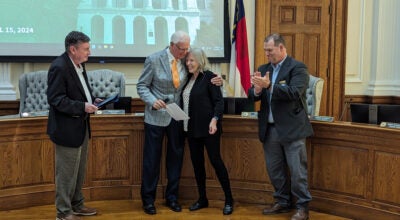Women earn more degrees than men
Published 12:00 am Saturday, June 11, 2011
By Sarah Campbell
scampbell@salisburypost.com
SALISBURY — On both the national and local levels, women are earning more degrees than men.
Census figures released earlier this year show roughly 20.1 million women have bachelor’s degrees, compared to nearly 18.7 million men. That trend has held steady since 1996 when women first passed men in bachelor’s degrees.
Throughout the past two decades, female graduates have exceeded males at Livingstone College with 1,160 women earning bachelor’s degrees compared to 1,062 men.
Catawba College followed the same trend during that time period with 2,280 women receiving bachelor’s degrees, compared to 1,880 men.
Nationally, women began to exceed men in college enrollment in the 1980s.
The trend holds true at Catawba, with slightly more women enrolling than men each year.
But men continue to outnumber women at Livingstone.
“The role of women has been changing over the last 30 to 40 years, therefore the opportunities for women have increased,” Catawba Provost Dr. Richard Stephens said. “College is simply a manifestation of that.”
• • •
Officials at Catawba and Livingstone said student engagement is a key component in degree completion.
Stephens said giving students a connection outside the classroom can provide the extra nudge they need.
“You need other motivations and opportunities for development of a student, whether it’s in the arts or athletics,” he said.
Carla Eastis, director of institutional research at Catawba, said in some cases women are more involved in extracurriculars than men.
“If you look at our Student Government Association representatives, they are disproportionately women,” she said.
State Alexander, special assistant to the president at Livingstone, said students who form bonds with peers of similar goals are also more likely to succeed.
“The sooner students engage and embrace and become a part of this new community, their loyalty and connectivity to the institution grows,” he said.
But Alexander said men oftentimes have a harder time making those connections than women. Male students continue to have tight bonds with high school peers who might not understand the value of a college degree.
“Sometimes those peer pressures don’t lend themselves well to a student psychologically or socially,” he said. “For some men in particular, that break is more difficult to make because they move in groups.”
• • •
Alexander said female students can be more successful than male students in college because they tend to come in more focused.
“Typically, their level of maturity evolves quicker than some men,” he said. “Men are typically unsettled; it takes a moment to get there.”
Eastis said when she looked at Catawba’s numbers, freshmen female students are more likely to have a major in mind.
“They are starting off college with a slightly different mindset than men,” she said.
Eastis said students who have some idea of what they want to study are typically more successful because they have a goal in mind.
She said high school GPAs and SAT scores seem to be less of an indicator for success than goals.
• • •
Alexander said another reason he’s seen more men than women drop out of school is because of financial responsibility.
“They might be the only one in the household where there may be an opportunity to earn money for the rest of the family, so they leave for family obligations,” he said. “It can be hard to separate themselves from particular circumstances.”
Alexander said some male students have trouble seeing beyond their present financial circumstances.
“We are trying to change students’ perspectives,” he said. “We know if they are able to stay the road, their families will be a lot better off in the long term.”
• • •
Stephens said the shift in societal expectations has also affected the number of women attending and completing college.
“As you look at the size of families, over decades they have tended to shrink,” he said. “Those families are more heavily investing in those children that they have. They want the best opportunities they can provide for them.”
Today, women also make up half of the work force, which means more women are turning to education for advancement opportunities.
“Women are seeking out their own road and exercising their rights,” Stephens said. “They really flourish in college.”
The Associated Press contributed to this report.
Contact reporter Sarah Campbell at 704-797-7683.
Bachelor’s degrees earned
Men Women
1991
Catawba 95 99
Livingstone 42 35
1992
Catawba 79 94
Livingstone 31 27
1993
Catawba 80 88
Livingstone 37 39
1994
Catawba 86 74
Livingstone 32 30
1995
Catawba 80 99
Livingstone 40 39
1996
Catawba 82 80
Livingstone 47 58
1997
Catawba 76 108
Livingstone 66 61
1998
Catawba 114 126
Livingstone 60 46
1999
Catawba 103 132
Livingstone 64 73
2000
Catawba 120 135
Livingstone 60 73
2001
Catawba Not available
Livingstone 56 58
2002
Catawba Not available
Livingstone 59 78
2003
Catawba 109 136
Livingstone 60 66
2004
Catawba 143 185
Livingstone 67 77
2005
Catawba 138 168
Livingstone 55 63
2006
Catawba 117 153
Livingstone 59 64
2007
Catawba 110 161
Livingstone 46 76
2008
Catawba 120 151
Livingstone 46 74
2009
Catawba 108 141
Livingstone 80 65
2010
Catawba 120 150
Livingstone 55 58
Total
Catawba 1,880 2,280
Livingstone 1,062 1,160




